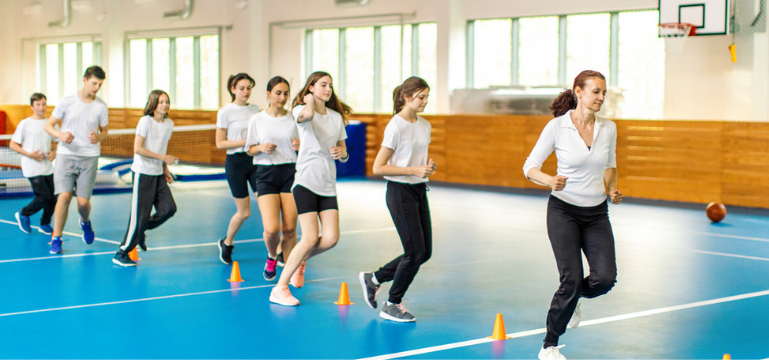Developing pupils’ understanding of the Welsh language and Welsh culture

Quick links:
Information about the school
Dylan Thomas Community School (DTCS) is an 11-16 English-medium school maintained by Swansea local authority. The school is situated in Cockett in Swansea and serves communities that experience significant levels of socio-economic challenge. There are 701 pupils on roll, which represents a three year high and increase of 136 pupils since the same date in 2021. Nearly 79% of the pupils live in the most deprived 20% of all areas in Wales and 66% live in the 10% most deprived. The three-year average for pupils eligible for free school meals is around 51%, which is significantly above the Wales average of 21.2%.
Around 10% of pupils speak English as an Additional Language (EAL). Around 36% of pupils have additional learning needs, which is significantly higher than the local authority average of 19.5%. Many (up to 75%) children entering the school have a reading age below their chronological age. Very few pupils hear or speak Welsh at home or in the community.
Context and background to the effective or innovative practice.
Curriculum for Wales prompted the school to evaluate how they develop pupils’ sense of ‘cynefin’ across the curriculum as a whole. As a result of this evaluation, a working party was established with the aim of enhancing the Welsh dimension across every area of learning and experience (AoLE). Significant work was undertaken across all AoLEs to ensure that the curriculum provides authentic opportunities for pupils to interact with Welsh language, history and culture.
In 2021, the school felt they should be doing more to develop the love and use of the Welsh language as well as promote and enhance pupils’ Welsh identity and the way in which they consider themselves as being ‘Welsh’. As such, Physical Education (PE) lessons were identified as being a vehicle for supporting the school drive to develop pupils’ Welsh language skills. The Assistant Headteacher and the AoLE lead for Health and Sport and staff from the local ITE partnership developed an innovative programme to deliver bilingual PE lessons. This was initially trialled for pupils in Year 7 as a pilot and linked with a targeted programme of professional learning for staff.
Description of nature of strategy or activity
At the outset of the bilingual PE project, the Health and Sport AoLE team received tailored support from staff at the local ITE partnership to develop their Welsh language skills. Staff in the PE department taught PE lessons bilingually without exception. A member of the Welsh teaching team was also timetabled to ‘team teach’ and support colleagues in these lessons and overcome any barriers should there be any. At the end of the first year the pilot was evaluated and it was agreed that it would be further rolled out to the point that all of Key Stage 3 now receive their PE lessons bilingually.
To complement and support this project all staff have been provided with professional learning in the Welsh language and support from senior colleagues to improve their confidence and use of Welsh across the school. This is helping leaders to drive Welsh further forward across the school
The work of the School Council is a strength of the school, and has been harnessed to further improve the development of the Welsh dimension. In addition to the existing LGBTQ+, Eco and BAME steering groups already in place, a Welsh Dimension steering group was also introduced to allow pupils to have a more significant impact on how the school develops the Welsh language and ‘cynefin’ across the curriculum and in the wider school community. The pupils involved in the Welsh Dimension steering group have:
- Established an extra-curricular Welsh club that is planned and run by Year 10 and Year 11 pupils on a fortnightly basis
- Delivered whole-school assemblies to promote the Welsh language and key Welsh events
- Planned and executed activities to mark whole-school celebrations of events such as Dydd Shwmae, Dydd Santes Dwynwen and Dydd Gwyl Dewi
Following the evaluation of the Welsh language and ‘cynefin’ across the curriculum by the ‘Welsh Dimension Working Party’, a significant amount of work took place to ensure that learning is focused on local and national themes that engage pupils, and develops pupils’ skills across the curriculum.
These learning opportunities have enhanced the way in which Welsh is perceived by all members of the learning community and have led to purposeful opportunities to develop the sense of ‘cynefin’. A number of co-ordinated whole-school activities take place on a regular basis. For example, a weekly ‘Welsh Wednesday’ was established across the school, where form tutors lead a Welsh language or cultural based activity that is planned to reinforce the language being studied by pupils in Welsh lessons outside of the Welsh classroom. This is also an opportunity for form tutors to promote the ‘Brawddeg yr Wythnos / Phrase of the Week’.
What impact has this work had on provision and learners’ standards?
The amount of Welsh used across the school, not only within PE lessons, has significantly increased. It is common practice that staff and pupils use Welsh across the school as part of everyday communication. In all lessons, pupils are accustomed to receiving and responding to Welsh instructions.
The school’s commitment to developing pupils’ Welsh language skills and sense of ‘cynefin’ across the school has had a direct impact on how pupils achieve in Welsh as a subject. Pupils’ attitudes to learning have improved and as a result the number of pupils achieving A*-C in GCSE Welsh second language has more than doubled since the school first embarked upon this work in 2019. In addition, the proportion of pupils achieving A*-A in Welsh second language has also improved. This is testament to the high expectations that all staff have regarding Welsh across the school, which has notably enhanced the status of the subject both inside and outside of the classroom.